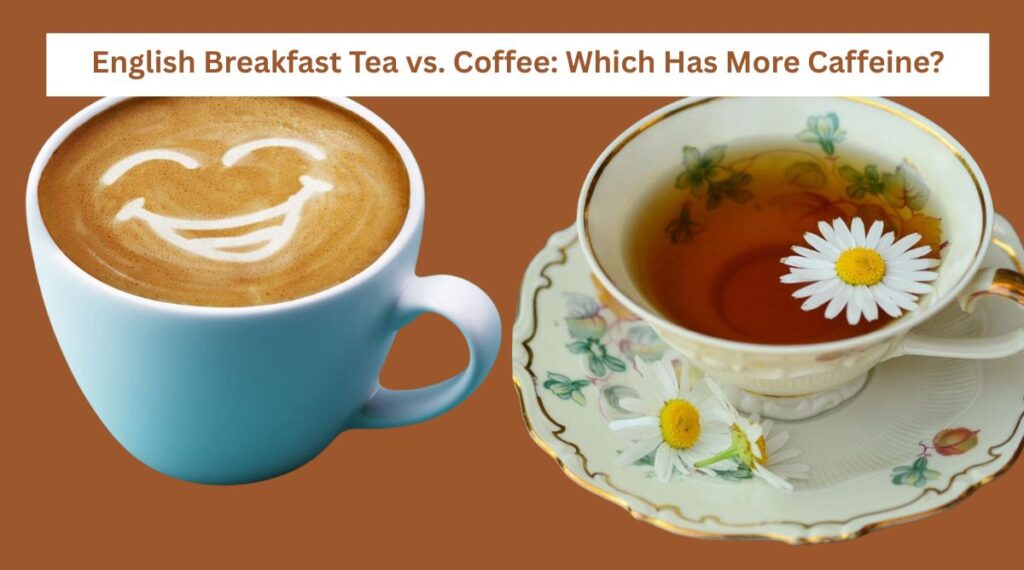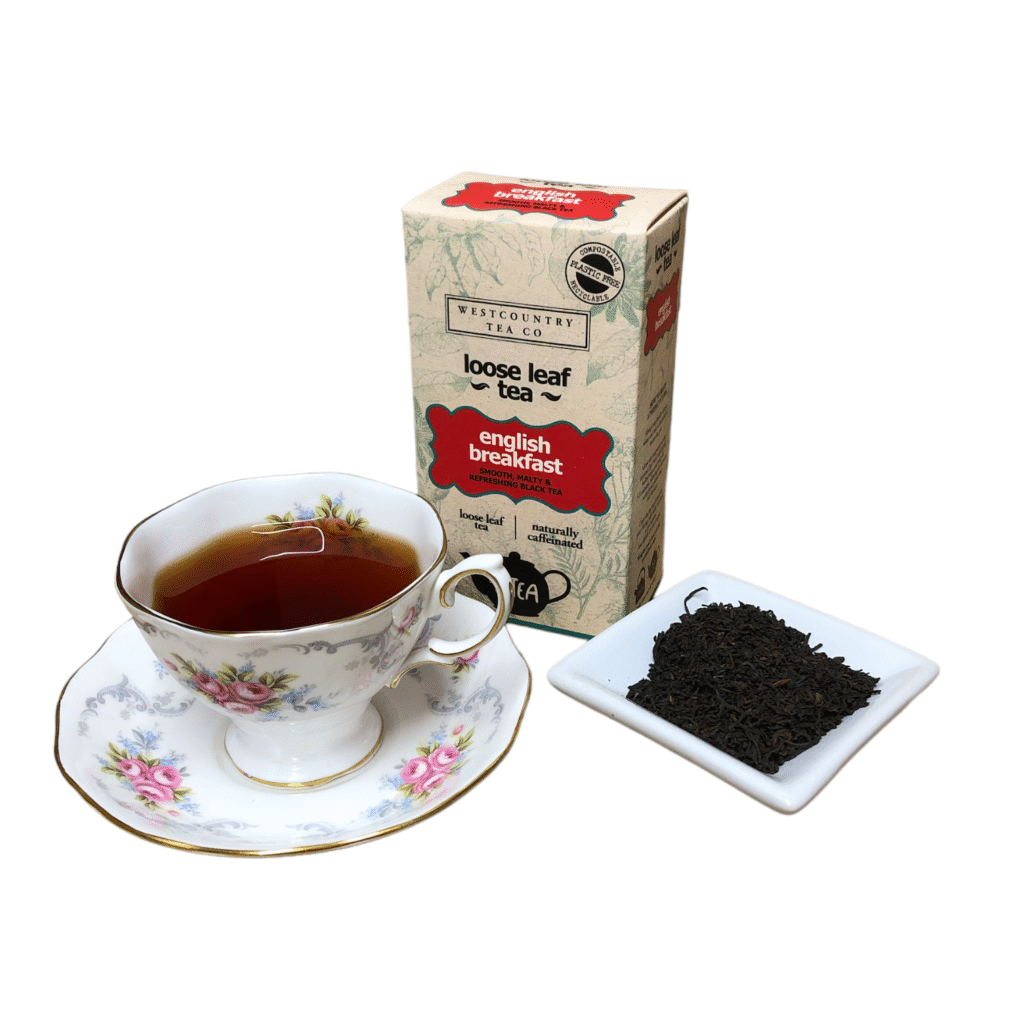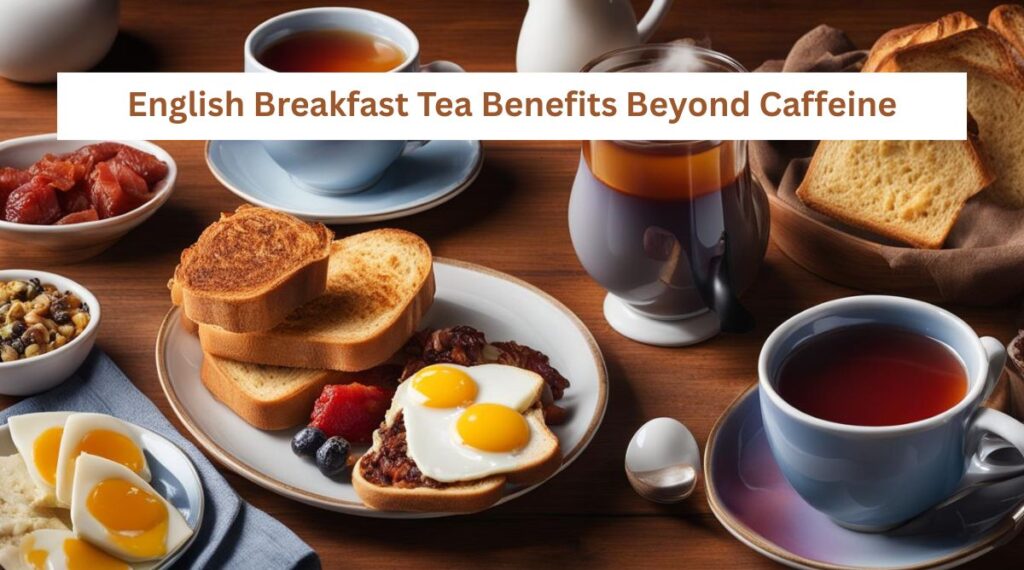How Much Caffeine in English Breakfast Tea? The Ultimate Guide
Did you know that a cup of English breakfast tea can contain just as much caffeine as a cup of coffee? While many people enjoy this classic beverage for its robust flavor and comforting warmth, the caffeine content can vary significantly based on brewing time and tea type.
Understanding how much caffeine in English breakfast tea? is essential for managing your daily intake, especially if you’re sensitive to stimulants. We’ll explore the caffeine levels in English breakfast tea, helping you make informed choices about your tea-drinking habits.
How Much Caffeine in English Breakfast Tea?
English breakfast tea typically contains about 40 to 70 milligrams of caffeine per 8-ounce cup, depending on the brand and brewing method.

The English breakfast tea caffeine amount can vary based on factors such as the type of tea leaves used, the steeping time, and the water temperature. Black teas, including English Breakfast, have a higher caffeine content compared to green or herbal teas.
Factors Affecting Caffeine Content
- Type of Tea Leaves: English Breakfast tea is typically a blend of Assam, Ceylon, and Kenyan black teas, each with different caffeine levels. Assam tea, for example, is known for its high caffeine content.
- Brewing Time & Temperature: The longer you steep the tea and the hotter the water, the more caffeine is extracted. A 5-minute steep will yield more caffeine than a 2-minute steep.
- Loose Leaf vs. Tea Bags: Loose-leaf tea generally contains more caffeine than tea bags because it has larger, whole leaves with higher potency. Tea bags, often made with broken leaves or dust, may extract caffeine faster but in smaller amounts.
Caffeine Comparison with Other Teas & Coffee
| Beverage | Caffeine Content (per 8 oz) |
|---|---|
| English Breakfast Tea | 40-70 mg |
| Green Tea | 20-45 mg |
| Black Tea (General) | 40-90 mg |
| Coffee | 95-200 mg |
| Decaf English Breakfast | 2-5 mg |
Compared to coffee, English Breakfast tea offers a gentler caffeine boost with a smoother release of energy. It’s perfect for those who want moderate caffeine without the intensity of coffee.
English Breakfast Tea vs. Coffee: Which Has More Caffeine?
Coffee has significantly higher caffeine content than English Breakfast tea, making it better for quick energy. An 8 oz cup of coffee contains 95-200 mg of caffeine, compared to 40-70 mg in English breakfast tea. However, tea’s L-theanine promotes calm focus, offering smoother energy without jitters.

For those reducing coffee intake, English Breakfast tea provides moderate caffeine and gentler stomach effects. In the “English breakfast tea vs coffee” debate, tea excels for sustained energy, while coffee is preferable for immediate boosts.
Does English Breakfast Tea Have More Caffeine Than Green Tea?
English Breakfast tea typically contains more caffeine than green tea, with 40-70 mg versus 20-45 mg. This difference is due to the types of tea leaves and their processing methods.

However, green tea offers additional health benefits, being high in antioxidants like catechins that reduce inflammation. It also has L-theanine, which aids relaxation and mental clarity. In contrast, English Breakfast tea’s higher caffeine content makes it preferable for those seeking energy.
Who Should Drink Which?
- Drink English Breakfast tea if you need a stronger caffeine boost for focus and productivity.
- Choose green tea if you want gentle energy with more antioxidants and a calming effect.
So, “Does English Breakfast tea have more caffeine than green tea?” Yes, but if you’re looking for a balance between energy and relaxation, green tea might be the better fit.
How to Reduce Caffeine in English Breakfast Tea
If you love English Breakfast tea but want to cut down on caffeine, there are simple ways to enjoy a milder cup while keeping the flavor intact.

- Brew for a shorter time: Steeping tea for 1-2 minutes instead of 5 significantly reduces caffeine extraction. The longer the steeping, the higher the caffeine content.
- Use decaf English Breakfast tea: Decaffeinated versions contain only 2-5 mg of caffeine per cup, making them a great alternative.
- Steep tea leaves once before drinking: A quick 30-second pre-steep helps remove some caffeine from the leaves before making your actual cup.
- Blend with herbal tea: Mixing chamomile, peppermint, or rooibos with English Breakfast tea creates a flavorful, low-caffeine blend.
If you’re wondering, “How to reduce caffeine in tea without losing flavor?” these methods let you enjoy the bold taste of English Breakfast tea with less caffeine and a smoother experience.
English Breakfast Tea Benefits Beyond Caffeine
While many people enjoy English Breakfast tea for its caffeine boost, it offers far more than just an energy kick. This classic black tea blend is packed with health benefits that make it a great addition to your daily routine.

- Rich in Antioxidants: English Breakfast tea contains polyphenols and flavonoids, which help boost immunity and support heart health. These compounds fight free radicals and reduce inflammation, lowering the risk of chronic diseases.
- Promotes Calm Focus: Thanks to L-theanine, English Breakfast tea provides sustained mental clarity and focus without the jitters often associated with coffee. It enhances relaxation while keeping you alert.
- Supports Digestion and Metabolism: The tannins in black tea can aid digestion by soothing the stomach and promoting gut health. Additionally, its mild caffeine content can help boost metabolism and fat oxidation.
- A Great Alternative to Coffee: If you’re sensitive to caffeine, English Breakfast tea offers a gentler option. It provides a moderate energy lift without overstimulation, making it ideal for those who want to cut back on coffee.
So, when considering “English Breakfast tea benefits: more than just caffeine!”, remember that this tea supports overall health, focus, and digestion, making it a well-rounded daily drink.
Conclusion
The answer to “How much caffeine is in English breakfast tea?” is that the caffeine content in this tea typically ranges between 40 and 70 milligrams per 8-ounce serving, depending on factors such as brewing time and the specific blend used.
This moderate level of caffeine makes it an excellent choice for those looking to enjoy a gentle pick-me-up without the jitters often associated with coffee. The presence of antioxidants in tea can provide various health benefits, contributing to overall well-being.
FAQs
Is There a Lot of Caffeine in English Breakfast Tea?
A standard 8-ounce cup of English Breakfast tea contains about 40-70 mg of caffeine. The exact amount varies depending on brewing time and tea leaves used. It has less caffeine than coffee but more than green tea, making it a balanced choice.
Which Tea Is Highest in Caffeine?
Black tea has the highest caffeine content among common teas. A standard 8-ounce cup contains 40-90 mg of caffeine, depending on the type and brewing time. It provides a strong energy boost, making it a great alternative to coffee.
How Much Caffeine Is in English Tea vs. Coffee?
Coffee has significantly more caffeine than English tea. A standard 8-ounce cup of coffee contains 95-200 mg, while English Breakfast tea has 40-70 mg. Green tea has the least, with around 20-45 mg per cup.
How Much Caffeine Is in a Cup of Twinings English Breakfast Tea?
A cup of Twinings English Breakfast tea contains approximately 47 mg of caffeine. The exact amount may vary depending on brewing time and water temperature. It provides a moderate caffeine boost, making it a great choice for steady energy.
Does English Breakfast Tea Have Caffeine?
English breakfast tea contains 40-70 mg of caffeine per 8-ounce cup, varying by brew time and blend. Its robust flavor makes it a popular morning choice and a lighter alternative to coffee. Decaffeinated versions are also available for those who are sensitive to caffeine or wish to limit their intake.







